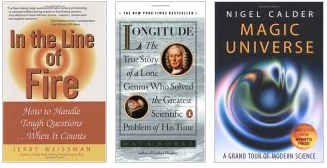All book lovers, you'd adore this!

You pop your music CD into the drive and notice that the PC has recognised it from an online catalogue!
Without any further assistance from you, it copies information about genre, the band, names of individual tracks, cover design, etc. into your library and neatens everything up.
Well, why don't they have something similar to catalog your books? It seems they do.
I took Library Thing for a test drive today.
"LibraryThing is an online service to help people catalog their books easily. You can access your catalog from anywhere—even on your mobile phone. Because everyone catalogs together, LibraryThing also connects people with the same books, comes up with suggestions for what to read next, and so forth."
Source: LibraryThing | Catalog your books online
I type in the name of one book (partially) and the website locates several editions of it on Amazon.com. One click and the book is added to my brand new online catalogue!
But that's not all. It listed several related books that people had tagged or catalogued. Oh, I had some of them too. So, click, click, click and my library grew to 15 before I stopped to check what was happening. See three random books from my collection below!

It seems people have already catalogued over 5.8 million books with them.
That would be easy to understand, except that the free account only holds 200 books.!
 While Microsoft Word's AutoSummarize can hardly deliver the Executive Summary for your next report, it has its uses.
While Microsoft Word's AutoSummarize can hardly deliver the Executive Summary for your next report, it has its uses. 
